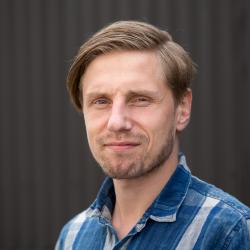Hörður Torfason is a musician and an activist. He was the first public figures to come out of the closet in Iceland back in the ‘70s and was the founder of The National Queer Organisation, Samtökin 78. Arguably no one is a better authority on the history of LGBTQ rights in Iceland, and few if any have done more to stand up and be accounted for.
“I felt someone needed to step forth publicly, so I came out on August 4, 1975, when an interview with me was published in a magazine,” says Hörður. “Society back then was incredibly rigid and square; we weren’t called homosexuals, we were called sexual deviants. But I was fortunate to have parents who always told me to be myself and stand for what I believe in, and I think that is what allowed me to step forth.”
Before the fateful interview Hörður was a much celebrated musician and actor, getting regular airplay on the radio and performing in packed theatres. But overnight that all changed.

“I lost my job and couldn’t get any work. I lost my home and couldn’t find anywhere to live. People spat on me on the street and I feared being attacked,” said Hörður. “It got to a point that I was afraid to answer my phone. I had to flee the country and go to Denmark and I contemplated suicide. But I decided that I needed to do something, and that is why I started Samtökin 78.”
The seeds of change
In the beginning, Hörður had a hard time even getting gay men onboard with the activist organisation.

“I realised that the most important thing is visibility. People need to see that you are normal. So I travelled around the country playing and then I just walked around all the towns in the country, and because people knew who I was—I was ‘the gay’—they peaked at me through their curtains and were curious. There always needs to be someone who takes the first step and dares to be visible and I took on that role.”
Far from over
Despite great strides having been made since Samtökin 78 was formed just under 40 years ago, the old adage “all that glitters is not gold” is apt for explaining the status of the queer community in Iceland. Each year ILGA Europe, the European Region of the International Lesbian, Gay, Bisexual, Trans and Intersex Association, releases Rainbow Europe, a review on the status of queer rights on the continent, and the recent report isn’t good. Tied in tenth with Greece, Luxembourg, Hungary and Slovenia, Iceland gets a paltry 47% rating out of 100%. The country may have achieved the huge landmark of appointing the first lesbian Prime Minister in 2009 and, in general, gay men and women are accepted in society, but when it comes to other minorities within the community (such as non-binary and trans people) it lags far behind its Scandinavian and European neighbours.
“I am a gay man and prejudices towards me are basically non-existent. You just have these old leftovers like Gylfi Ægisson, but other than that there is virtually nothing,” says
Daníel Arnarsson, Executive Director of Samtökin 78. “But I think that prejudices towards other groups are not acknowledged. Let’s say a 14 year old boy comes out and says that he has the incorrect gender, society will likely respond that it is wrong and just a phase. But if he came out as gay, then I think people for the most part would accept it. We understand that and everybody knows someone who is gay, but we always fear the unknown.”
Daníel mentions that among the things lagging behind is the possibility to register as a third gender and that no laws exist banning workplace discrimination of trans people. And possibly worse is how we treat queer refugees.
“It is almost comical that we’ve advertised ourselves as being this gay paradise—which is far from the truth—but then we don’t have any regulations recognising gay refugees,” says Daníel. “Samtökin 78 often gets contacted by refugees who want to come here, but there is nothing we can do for them. We don’t have the power or the finances to change the laws. I have heard of asylum seekers who are so afraid of being sent back that they have contemplated suicide.”
A walk through time
Much might still be left to do; the fight for human rights is never over. But it is clear that the status of the queer community has come very far from the time when prejudices forced Hörður to leave the country and Pride is about celebrating that change and the victories. And at the end of our chat Hörður painted an image that seems to capture the change perfectly:
“Just think about these two walks. One, when I walked down Laugavegur in 1975, with people spitting on me, shouting obscenities, and me fearing assault. And then, the Pride Parade today, where a 100,000 people walk down the same street supporting the rights we have earned.”
Buy subscriptions, t-shirts and more from our shop right here!
















